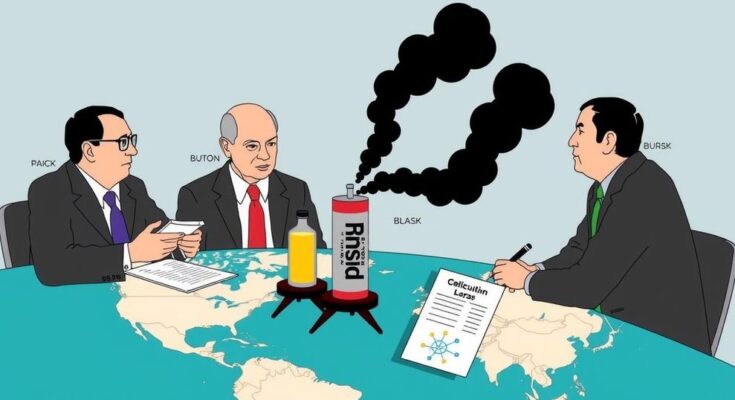With COP29 in Baku approaching, rising disillusionment is palpable as various leaders abstain, questioning the effectiveness of the summit. The escalating participation of fossil fuel lobbyists raises concerns over the integrity of climate negotiations, prompting calls for a ban on their participation. Activists advocate for reforms to ensure that corporate interests do not derail substantial climate commitments, especially as Brazil prepares for COP30 amid mounting climate challenges.
As COP29 approaches in Baku, Azerbaijan, the absence of numerous heads of state, including King Charles and Greta Thunberg, signals a growing disenchantment with climate negotiations. This year’s summit, amidst record high temperatures, has drawn significant skepticism regarding the effectiveness of COP, historically a beacon of hope for climate action since the Kyoto Protocol established in 1997. The influence of fossil fuel interests remains a critical concern, prompting calls for reform and tighter regulations on industry participation.
Historically, the UN Climate Change Conference (COP) has served as a vital platform for international climate commitments, with major agreements emerging from this forum. However, as global temperatures surpass the critical threshold of 1.5°C and leadership changes in major nations regress climate commitment, faith in COP’s ability to effect change dwindles. Fossil fuel lobbyists’ growing attendance at these events is increasingly viewed as a conflict of interest, prompting urgent discussions about their role and influence within the COP process.
Notably, the fossil fuel industry is not new to COP; their presence has been legitimized by Article 4 of the UNFCCC and the industry’s narrative as part of the transition to greener energy has been accepted. However, recent trends show a surge in fossil fuel representation at climate talks, overshadowing delegates from climate-vulnerable nations. Reports indicate a significant increase in lobbyists attending COP events, questioning the legitimacy of discussions without balanced representation from actual climate advocates.
Calls for reform have intensified, spearheaded by influential figures advocating for a conflict-of-interest policy that would ban fossil fuel representatives from future conferences. The recent letter from esteemed climate leaders highlights the need for a hosting policy that excludes petrostates and emphasizes genuine commitments to the Paris Agreement. Critics argue that the overwhelming presence of fossil fuel lobbyists, who are often found promoting their interests under the guise of environmental advocacy, undermines the conference’s integrity.
James Marape, President of Papua New Guinea, articulated the growing frustration with COP, deeming it a “total waste of time”. In response to increasing skepticism, climate activists are calling for stricter regulations on corporate participation, akin to efforts preventing tobacco lobbyists from influencing public health discussions. However, achieving such reforms within the collaborative framework of the UN poses significant challenges.
The stakes for COP30 are considerable, especially as Brazil prepares to host, bringing its unique environmental challenges and opportunities to the forefront. With a commitment to curtail deforestation and a significant focus on fossil fuel reduction, Brazil’s leadership could pave the way for a more effective and accountable COP agenda.
The UN Climate Change Conference, known as COP, serves as the global platform for nations to negotiate and implement climate initiatives. COP has historically led to critical agreements, such as the Kyoto Protocol and the Paris Agreement. However, its functionality has been increasingly questioned due to the escalating influence of fossil fuel lobbyists, which many contend undermines the legitimacy of climate discussions and decisions made at these conferences. As climate emergencies intensify, the question of whether fossil fuel interests should be barred from participating in these talks gains urgency amidst a backdrop of a stubborn reliance on fossil fuels, rising global temperatures, and widespread calls for robust climate action.
In conclusion, the ongoing discourse surrounding fossil fuel lobbyists and their influence at COP highlights a crucial tension within international climate negotiations. As global leaders reconsider the role of fossil fuel interests in climate discussions, calls for reform are gaining momentum. Brazil’s upcoming presidency at COP30 presents an opportunity to reshape the agenda, emphasizing the need for robust policies to ensure that negotiations serve genuine climate action rather than corporate interests, thereby restoring faith in the COP process.
Original Source: www.corporateknights.com




